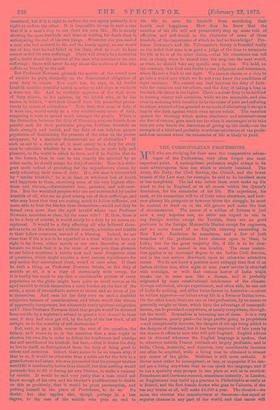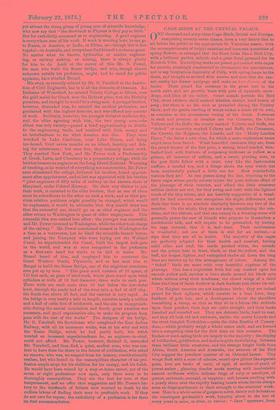THE COSMOPOLITAN PROFESSIONS.
ATEN who are studying for their sons the comparative advan.
rages of the Professions, very often forget one most important point. A cosmopolitan profession ought always to be more advantageous than one which is strictly localised. The Army, the Navy, the Civil Service, the Church, and the lower branch of the Law may, for example, be said to be localised more or less completely. The lad who enters them must make up his mind to live in England, or at all events within the Queen's dominions, for the remainder of his life. His experience, his rank, or his connection will be of little value elsewhere, and how-. ever gloomy his prospects or however bitter the straggle, he must be content to work on in the old groove and make the best of circumstances. The career of a soldier of fortune is last now a very hopeless one, no sailor can expect to rise in any foreign service except the Turkish, there are no good positions in the foreign Mercantile Marine except for engineers, and we never heard of an English attorney succeeding in New York. Barristers do sometimes, and 'a few of both branches of the profession have chances open to --tliern in India ; but for the great -majority life, if life is to be com- fortable, must be passed in one locality. The same restric- tion applies in an increased degree to the Indian Civil Service, and is the one serious drawback upon an otherwise attractive career. We do not know a position more unhappy than that of an Indian civilian who, after eight or nine years' service is attisekr with nostalgia, or with that curious horror of India which breaks out in some men like a disease, and is probably originated by some constitutional intolerance of the climate. Always cultivated, always experienced, and often able, he can out of India do nothing, and either turns farmer in Australia—a career he seldom approves—or loiters away life in a Swiss or Italian town. On the other hand, there are one or two professions, by no means so generally sought as these, which have the advantage of cosmopoli- tanism, can be practised everywhere, or nearly everywhere, through. out the world. Journalism is becoming one of these. It is a-very bad profession, poorly paid—the large profits going to proprietots —and exceptionally insecure, the dangers of old age being added to the dangers of dismissal, but it has been improved of late years by the chance it offers to men who will quit England. English editors are in demand wherever the English language is spoken, that is, wherever outside France journals are largely profitable, and in India, China, Australia, and America, very considerable incomes can often be acquired, while a living may be obtained in almost any corner of the globe. Medicine is still more catholic. A doctor must either be incompetent, or lazy, or unpopular if he can- not get a living anywhere that he can speak the language, and if he has a specialty may prosper in one place as well as in another: Frenchmen and Germans succeed, sometimes instantly, in London, an Englishman may build np a practice in Philadelphia as easily as in Bristol, and the first female doctor who goes to. Calcutta, if she has any brains at all, will make £6,000 a year. The chemist—we mean the chemist who manufactures or discovers—has equal or superior chances in any part of the world, and that career will
yet attract the rising group of young men of scientific knowledge, who now say that " the drawback to Physics is they pay so little." But for catholicity commend us to engineering. A good engineer is everywhere sure of his work. If work is wanting here, he can go to Russia, or America, or India, or China, or—though this is less hopeful—to Australia, and everywhere find himself a welcome guest. No matter what he knows, hydraulics or marine engineer- ing, or railway making, or mining, there is always plenty for him to do. Look at the career of this Mr. S. Power, the man who built the Soane bridge, and who, though almost unknown outside his profession, might, had he cared for public applause, have rivalled Brunel.
His story, as recently related by Mr. G. Turnbull to the Institu- tion of Civil Engineers, has in it all the elements of romance. An Irishman of Waterford, he entered Trinity College at fifteen, won the gold medal for Greek, won the Hebrew prize, won the Divinity premium, and thought he would be a clergyman. A younger brother, however, dissuaded him, he entered the medical profession, and graduated with the highest honours, and was offered any amount of work. Suddenly, however, the younger declared medicine dry, and the elder agreeing with him, the two young men—the eldest was only twenty—passed a brief apprenticeship in Dublin to the engineering trade, and resolved with little money and no introductions to see what America was like. They were wrecked in Lake Caschican, near Lake Huron, and being ice-bound, lived seven months on an island, hunting and fish- ing for subsistence ; but once free, they instantly found work. They reached New York, and Mr. Power took a Professorship of Greek, Latin, and Chemistry in a preparatory college, while his brother became an engineer on the Long Island Railroad. Wearying of teaching, as he wearied of everything not constructive, Mr. Power soon abandoned the college, followed his brother, found appoint- ment after appointment, and attest was appointed with his brother " joint engineers of fifty miles of railway on the eastern shore of Maryland, under Colonel Kearney. On their way thither to join their work, it occurred to the elder brother, that as one of them must be subordinate to the other on such a work, and as their pre- vious relative positions might possibly be changed, which would be unpleasant, it would be advisable that they should draw lots that the successful one should go on as chief engineer, and the other return to Washington in quest of other employment. This romantic idea was carried into effect ; the younger was successful, and Mr. Power returned to Washington, while the other took charge of the railway." Mr. Power maintained himself in Washington for a time as a contractor, but he liked the scientific branch better, and joining the Company who were laying out the Welland Canal, he superintended the Canal, built the largest lock-gate in the world, and was at once recognised in the profession as a first-rate hand for works to be laid in water. Mr. Brunel heard of him, and employed him to construct the Great Western Docks, Plymouth, and at last sent him to Bengal to build the Soane Bridge, one of the mightiest structures ever put up by man. " This great work consists of 28 spans, of 150 feet each, on piers of brickwork, which piers stand upon brick cylinders or wells of 18 feet diameter, three wells to each pier. These wells are sunk more than 32 feet below the low-water level, through the sandy bed of the river into a bed of stiff clay ; the floods rise above 20 feet, and the current is very rapid. As the bridge is very nearly a mile in length, contains nearly a million, and a half of cubic feet of brickwork, and the site is unapproach- able during the annual inundation and floods, great exertion was necessary, and good organisation also, to make its progress keep pace with the rest of the works." The designer of the bridge, Mr. G. Turnbull, the Scotchman who completed the East Indian Railway, with all its enormous works, was at his wits' end with the Soane Bridge, which he had partly built, but which wanted an incessant superintendence he, as engineer-in-chief, could not afford. Mr. Power, however, finished it, succeeded Mr. Turnbull, and then died, a quiet, modest man, who was con- tent to have done his share in the labour of civilisation, who asked no renown, who was, we suspect from his history, constitutionally restless, but who found in the cosmopolitan character of his pro- fession ample scope for his abilities, for his energy, and his foible. He would have been ruined by a stay-at-home career, yet of the seven or eight professions now open, only three seem to be thoroughly cosmopolitan. They are the best for men of that temperament, and we offer that suggestion and Mr. Power's his- tory to the tholfsands of fathers now worried to death by the - endless labour of finding their sons in profitable work. If they do not care for repose, the catholicity of a profession is for them its first recommendation.



































 Previous page
Previous page